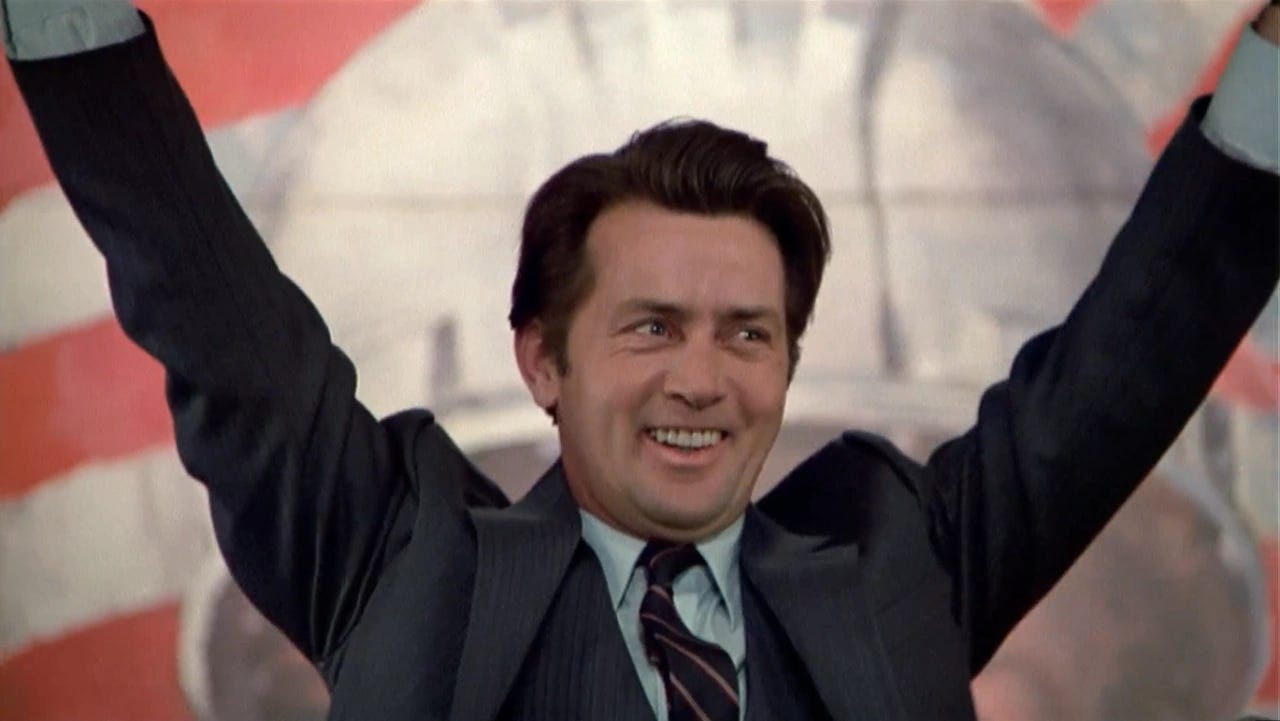Is the Greg Stillson scandal survivable?
In the climax to 'The Dead Zone,' Christopher Walken succeeds in derailing the campaign of a populist outsider. But would he have succeeded in 2022?
In David Cronenberg’s 1983 thriller The Dead Zone—and the Stephen King book from which it’s adapted—Johnny (Christopher Walken) is a high school teacher who gets into a car accident, falls into a coma and wakes up, miraculously, five years later. (It’s four in the book.) The accident curses him with the gift of clairvoyance, giving him the ability to see certain future events by touching people’s hands or significant objects. Johnny’s second sight plays a role in several suspense setpieces, including the capture of a serial murderer known as the Castle Rock Strangler, but all roads lead to Greg Stillson (Martin Sheen), a third-party U.S. Senate candidate who’s running as a populist outsider. As the campaign picks up steam, Johnny shakes Stillson’s hand and experiences a bracing vision of Stillson, as President of the United States, ordering a preemptive nuclear strike.
The big question in The Dead Zone is a twist on a popular hypothetical: Knowing what you know now, if you had the chance to kill Adolf Hitler before he came to power, would you do it? King would revisit a similar premise decades later in his 2011 novel (and the Hulu miniseries) 11/22/63, in which his hero discovered a portal that set him back in time long enough to kill Lee Harvey Oswald and stop the Kennedy assassination, thus preventing one of the darkest inflection points in American history. The two works come to difficult conclusions about the consequences of changing the future—the alternate reality where JFK lives proves ironically darker our own, while ending Stillson’s political career seems to work out just peachy—though one of the more striking aspects of 11/22/63 is that history itself becomes the book’s most imposing foe. It doesn’t want to change and will act against anyone who tries.
The Reveal is a reader-supported newsletter dedicated to bringing you great essays, reviews and conversation about movies (and a little TV). While both free and paid subscriptions are available, please consider a paid subscription to support our long-term sustainability.
In recent years, The Dead Zone has lingered as a prophetic vision of American politics. In the film’s climax, Johnny tries to shoot Stillson from the balcony at a campaign event. He misses, but in a mad scramble to protect himself, Stillson uses a baby as a human shield; when Johnny is dying and gets one last vision of the candidate’s future, he’s relieved to learn that Stillson’s cowardice has derailed his bid for power. Last week, Fangoria editor Phil Nobile, Jr. tweeted, “In real life, Greg Stillson would still get elected.” The unexpected postscript to The Dead Zone is that the “Would you kill Hitler?” hypothetical has become a bit of a yawner. The most pressing question is: “What scandals are survivable?”
In the lead-up to the first Republican presidential primary in Iowa in 2016, Donald Trump boasted at a campaign rally that he “could stand in the middle of 5th Avenue and shoot somebody and I wouldn’t lose voters.” At the time, it was a brag about the loyalty of his supporters, who had given him an early lead in the polls, though many in the mainstream media still considered his candidacy a vain, unserious sideshow. Surely, the thinking went, his daily gaffes—along with steady reports about his brazen fraudulence and corruption, his vile racism and misogyny, and the “room-temp oatmeal of his brain”—would be his undoing. There’s a reason professional politicians focus-group every syllable of what they say, because shooting from the hip usually results in you clipping your own leg.
And yet, nothing happened. Trump won the Republican nomination. Then on October 7th, 2016, a month before the election and two decades before the second debate between Trump and Hillary Clinton, he faced his Greg Stillson moment. A 2005 video from behind the scenes of Access Hollywood surfaced, featuring audio of a bus conversation where Trump boasted to host Billy Bush that being a star allows him to “do anything” to women, like kiss them or “grab ‘em by the pussy.” For a candidate trailed by multiple sexual assault allegations, this should have been a smoking gun. Trump, of course, would go on to win the election. He had shot somebody in the middle of 5th Street and gotten away with it.
So, again, the question: Does Stillson use a baby as a human shield and still get elected? In the film, he’s so worried about a negative newspaper editorial that he breaks into the writer’s office and threatens him with photographs of his extramarital affair. Swinging that baby around, in 1983 America, seems like a fairly catastrophic move. But the fact that we even have to ask ourselves, in 2022, whether that would derail the Stillson Train, is a bitter commentary on what is now morally permissible in American public life. Cronenberg’s film doesn’t provide much detail about Stillson’s specific pitch to voters, but fake-blue-collar-hardhat image aside, the parallels to Trump are uncanny: The anger in his tone, the nativist appeal of his campaign backdrops and literature, and the phony outsidership of his third-party bid, which mirrors Trump’s shrewd efforts to run against the “establishment” within his own party.
Today, the baby-as-a-human-shield photograph would be damaging but spinnable, just as the Access Hollywood tape was. (Though it may only be spinnable on a Presidential campaign level, because the stakes are so high. A Senate seat in New Hampshire seems a little dicier.) It certainly looks cowardly, but so did getting a deferment from the Vietnam War for “bone spurs.” But for Stillson, his campiagn, and whatever media apparatus might support him, it’s easy to paint Johnny as a political terrorist who seeks to defy the will of the people, which puts him in league with Stillson’s opponents, both in the election and in the media. It would be up to voters to look past Stillson’s personal flaws and embrace a campaign that’s much bigger than he is. There is a swamp to be drained, after all.
And yet, Greg Stillson isn’t the only political figure in The Dead Zone that should scare us. The film’s most insidious bad guy is Roger Stuart (Anthony Zerbe), the wealthy man who hires Johnny to tutor his son Chris, who’s intelligent, but lacks the motivation and social skills to come out of his shell. Johnny succeeds in reaching Chris, but then has a terrible vision of like-aged boys in hockey uniforms falling through an icy pond on Stuart’s estate. He pleads, as only Christopher Walken can, for Stuart to call off the practice he’d arranged for his son and his friends. It costs Johnny his job, but he leaves thinking he’d successfully scared Stuart off. As it turns out, he only scares Chris off. His father holds the practice anyway and two boys drown.
But that arrogance is more of a symptom of Stuart’s broader treachery. When Johnny is first brought out to the estate to meet Chris, Stuart is wrapping up a pleasant walk-and-talk with a political upstart by the name of Greg Stillson, who makes a plea for the rich man’s financial support and presses a campaign pin into Johnny’s hand. Afterwards, Stuart warns Johnny, “Get registered, pal, and vote against this turkey” and wonders why voters can’t see through his act. That confuses Johnny: Why would Stuart indulge this candidate that he clearly sees as a dangerous political force? Stuart gives Johnny a sly smile and says, “If he wins, you have to make sure you’re thought of as a good friend.”
The Dead Zone doesn’t come back to Stuart after the two kids drown. The last shot Cronenberg leaves us with is Stuart looking utterly dejected by the fireside, having paid the price for not heeding Johnny’s warning. But there’s no reason to believe that in a political reality where Stillson survives using the baby as a human shield—or survives multiple sexual assault allegations, a self-dealing foundation, a phony college, two impeachments, etc.—Stuart will continue to be thought of as a good friend. Money has no conscience. That’s as true in the contemporary setting of King’s novel and Cronenberg’s film as it is today, when extremists can expect the support of the Roger Stuarts of the world. Even when it’s obvious to seers much less gifted than Johnny that the country is about to fall through the ice.
The Dead Zone is currently streaming on HBO Max. The third and final part of our discussion of David Cronenberg’s work runs tomorrow. The first two can be found here and here.






I rewatched this a couple months ago (hat tip to the With Gourley and Rust podcast) and wondered the same thing. He’d survive it for sure and there would be talk about how smart he was for using an effective shield. It shows his creative thinking and the kind of genius that would blah blah blah. And the fact that he was shot at by one of those grabby, whiny teachers? Forget about it. All they’d need to do then is compare and contrast him with his panty-waist Democratic opponent (whomever it is doesn’t matter since they’d get the same coat of “socialist, wuss, senile, etc rinse and repeat) and he’d be President. And his followers would be singing his praises as the missiles landed.
Even Watergate wouldn’t end a presidency now. Scandals don’t teach us anything. They just expand what we’re willing to live with.
Same Republicans who are trying to spread faux-moral panic about "groomers" nearly elected pedophile to U.S. Senate over hero of Civil Rights movement. Republican voters have shown us time and again they have no morals or conscience whatsoever, and value party loyalty and power over all other situations. They would have voted for Stillson if he had *thrown* baby at Johnny. They probably would have voted for him if he had *shot* baby, given how quick right-wingers were to venerate Kyle Rittenhouse.
Stuart is better metaphor for contemporary politics. Everyone knew exactly what Trump was in advance of him taking office. Plenty of people knew exactly how bad things would be with George W. Bush in office. But it not matter how well you can see future if no one willing to listen. Or worse, if they actively want that terrifying future to come to pass.